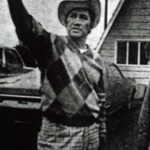Interviewer: Janice Tiland
Interview Date: July 24, 1975
Location: Unknown
Duration: 1:02:35
This interview with Robert Rilatos, a member of the Confederated Tribes of Siletz Indians, begins with descriptions of the many tribes that were brought to the Siletz Reservation and the origins of the word ‘Siletz.’ Rilatos then explains what life was like for the tribes before the Europeans arrived and also describes life on the reservation, emphasizing the ways in which the tribes were deliberately mistreated and even starved.
Next, Rilatos explains Oregon’s tribal divisions and history with the US government through various treaties. He then discusses the influence of Christianity on the tribes and several local figures, including Depoe Charlie. From there, Rilatos analyzes the Allotment Acts of 1882, 1884, and 1892, which were supposed to give land allotments to all Native Americans, but wound up offering only about 300 parcels for 2,000 people. He also describes the industries that the members of the Siletz tribes worked in in the 19th and 20th centuries. Rilatos then moves on current work that the Confederated Tribes of Siletz Indians were doing to teach their history and traditions. He also describes the history of the Depoe Bay Salmon Bake, an annual gathering of Oregon tribes that ended in the 1940s.
As the interview nears its conclusion, Rilatos discusses the organization of the Siletz people into the Confederated Tribes of Siletz Indians, and the history of tribes trying to band together against oppression by the US federal government. Rilatos ends the interview with a description a traditional indigenous gambling game that dates to a time before European colonization.
Robert Rilatos was born in 1931 in Oregon. His grandfather was a Rogue River tribal member and his grandmother a Molalla. He was a member of the Confederated Tribes of Siletz Indians and helped introduce a bill in Congress to restore their federal status as a tribe. He passed away in 1984.
The transcript presented here was generated by the Horner Museum and includes editorial notes added by the museum's staff.
Dublin Core
Title
Description
Next, Rilatos explains Oregon’s tribal divisions and history with the US government through various treaties. He then discusses the influence of Christianity on the tribes and several local figures, including Depoe Charlie. From there, Rilatos analyzes the Allotment Acts of 1882, 1884, and 1892, which were supposed to give land allotments to all Native Americans, but wound up offering only about 300 parcels for 2,000 people. He also describes the industries that the members of the Siletz tribes worked in in the 19th and 20th centuries. Rilatos then moves on current work that the Confederated Tribes of Siletz Indians were doing to teach their history and traditions. He also describes the history of the Depoe Bay Salmon Bake, an annual gathering of Oregon tribes that ended in the 1940s.
As the interview nears its conclusion, Rilatos discusses the organization of the Siletz people into the Confederated Tribes of Siletz Indians, and the history of tribes trying to band together against oppression by the US federal government. Rilatos ends the interview with a description a traditional indigenous gambling game that dates to a time before European colonization.
Robert Rilatos was born in 1931 in Oregon. His grandfather was a Rogue River tribal member and his grandmother a Molalla. He was a member of the Confederated Tribes of Siletz Indians and helped introduce a bill in Congress to restore their federal status as a tribe. He passed away in 1984.
The transcript presented here was generated by the Horner Museum and includes editorial notes added by the museum's staff.

